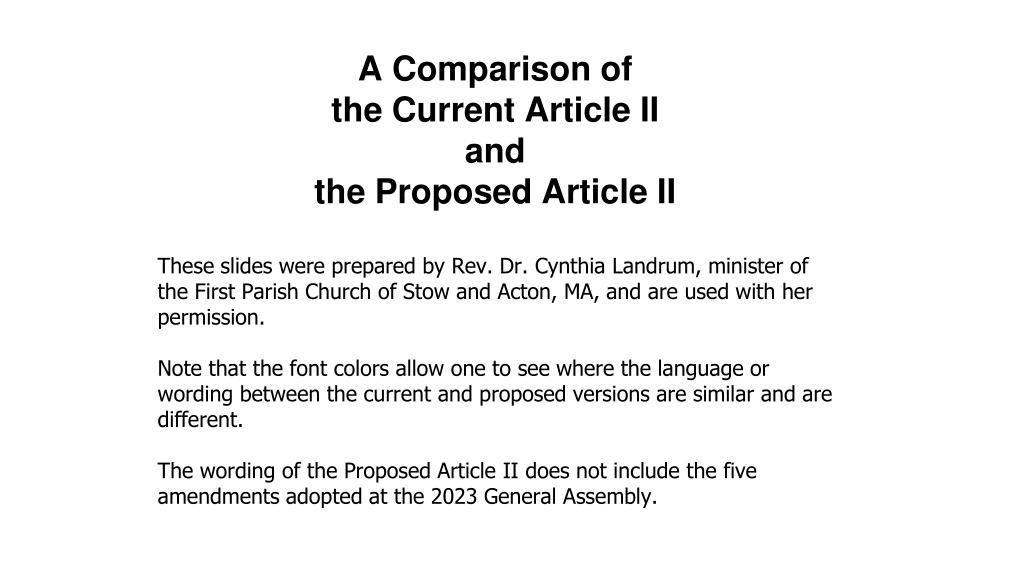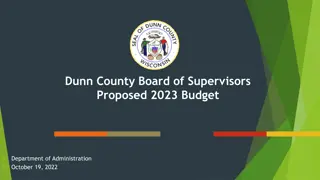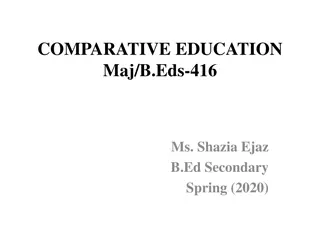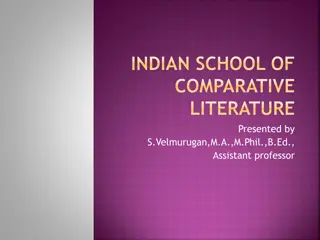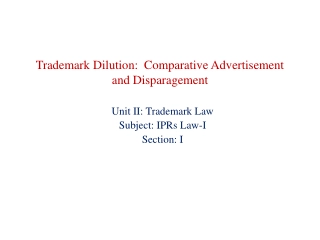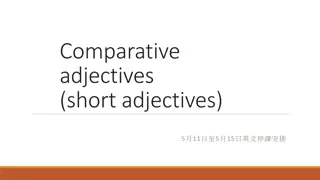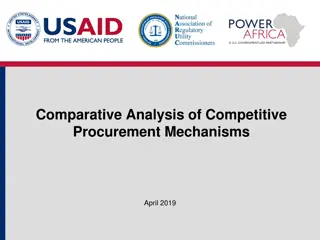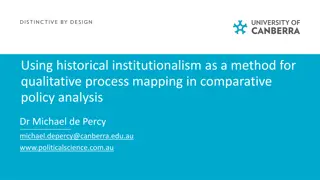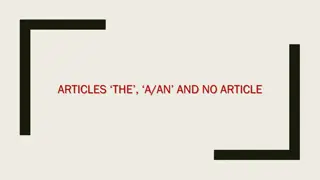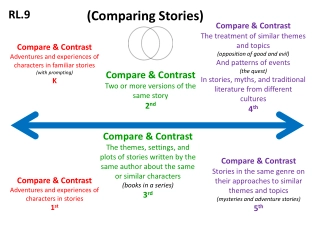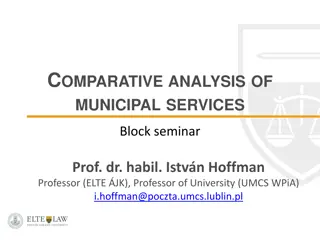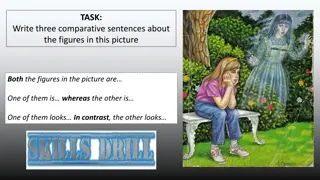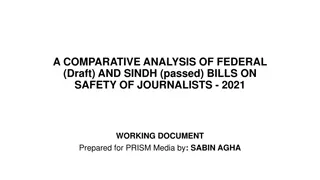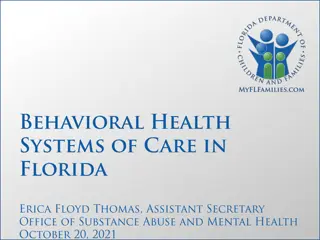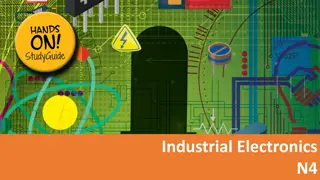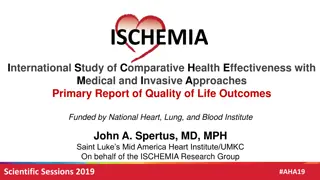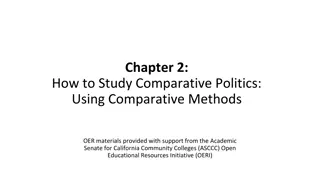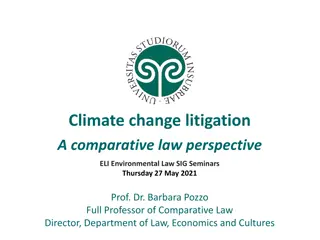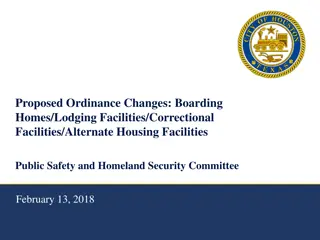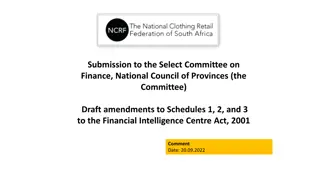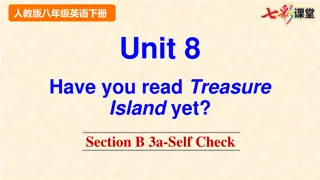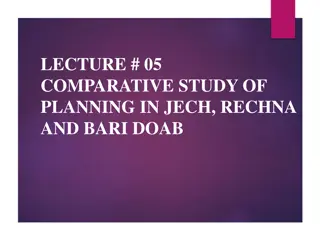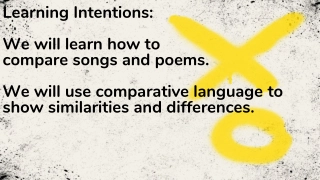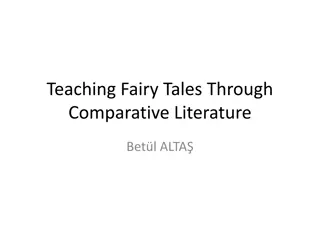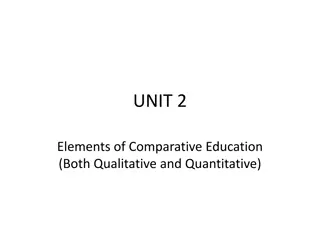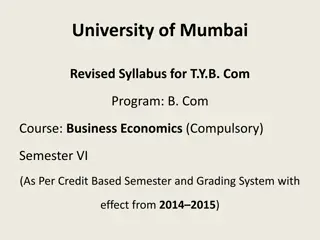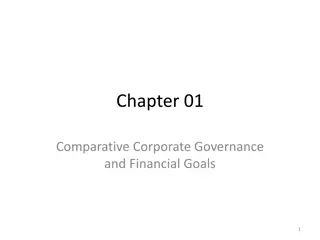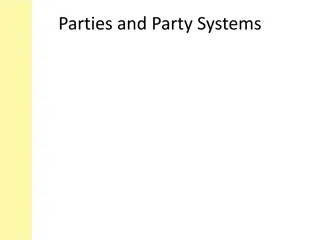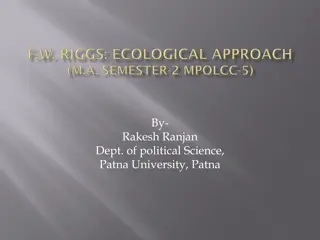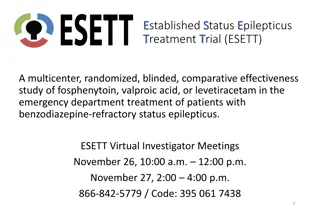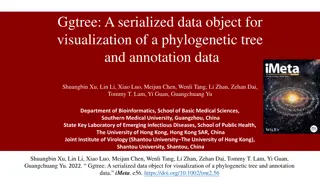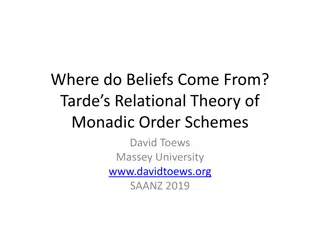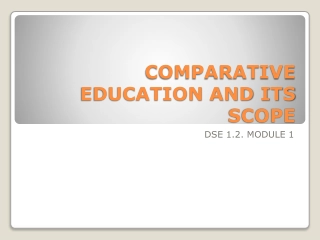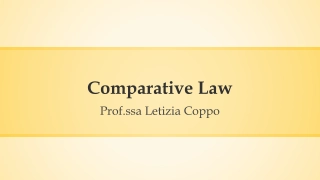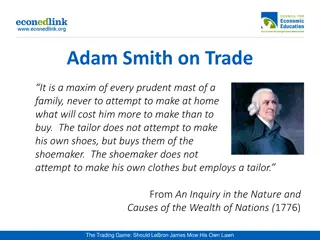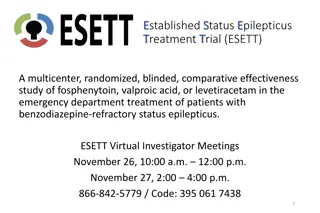A Comparative Analysis of Current and Proposed Article II
Comparison of the current and proposed Article II, prepared by Rev. Dr. Cynthia Landrum, focusing on the differences and similarities in wording. The proposed Article II excludes amendments adopted in the 2023 General Assembly. Additionally, it contrasts the sources of inspiration, values, and covenant practices of Unitarian Universalists. The slides offer insights into the evolving language and principles within Unitarian Universalism, emphasizing the core values of love, accountability, and shared wisdom.
Download Presentation

Please find below an Image/Link to download the presentation.
The content on the website is provided AS IS for your information and personal use only. It may not be sold, licensed, or shared on other websites without obtaining consent from the author. Download presentation by click this link. If you encounter any issues during the download, it is possible that the publisher has removed the file from their server.
E N D
Presentation Transcript
A Comparison of the Current Article II and the Proposed Article II These slides were prepared by Rev. Dr. Cynthia Landrum, minister of the First Parish Church of Stow and Acton, MA, and are used with her permission. Note that the font colors allow one to see where the language or wording between the current and proposed versions are similar and are different. The wording of the Proposed Article II does not include the five amendments adopted at the 2023 General Assembly.
Article II Slides by: Rev. Dr. Cynthia L. Landrum, First Parish Church of Stow and Acton
The Sources Compared with Inspirations Current Sources The living tradition which we share draws from many sources: Direct experience of that transcending mystery and wonder, affirmed in all cultures, which moves us to a renewal of the spirit and an openness to the forces which create and uphold life; Words and deeds of prophetic people which challenge us to confront powers and structures of evil with justice, compassion and the transforming power of love; Wisdom from the world's religions which inspires us in our ethical and spiritual life; Jewish and Christian teachings which call us to respond to God's love by loving our neighbors as ourselves; Humanist teachings which counsel us to heed the guidance of reason and the results of science, and warn us against idolatries of the mind and spirit; Spiritual teachings of Earth-centered traditions which celebrate the sacred circle of life and instruct us to live in harmony with the rhythms of nature. Proposed Inspirations As Unitarian Universalists, we use, and are inspired by, sacred and secular understandings that help us to live into our values. We respect the histories, contexts and cultures in which they were created and are currently practiced. These sources ground us and sustain us in ordinary, difficult, and joyous times. Grateful for the religious ancestries we inherit and the diversity which enriches our faith, we are called to ever deepen and expand our wisdom. Grateful for the religious pluralism which enriches and ennobles our faith, we are inspired to deepen our understanding and expand our vision. As free congregations we enter into this covenant, promising to one another our mutual trust and support.
Proposed Values and Covenant (2023) As Unitarian Universalists, we covenant, congregation-to-congregation and through our association, to support and assist one another in our ministries. We draw from our heritages of freedom, reason, hope, and courage, building on the foundation of love. Love is the power that holds us together and is at the center of our shared values. We are accountable to one another for doing the work of living our shared values through the spiritual discipline of Love. Inseparable from one another, these shared values are:
Other Sources in the Values & Covenant The Unitarian Trinity of Freedom, Reason & Tolerance Values As Unitarian Universalists in religious community, we covenant, congregation-to- congregation and through our association, to support and assist one another in our ministries. We draw from our heritages of freedom, reason, hope, and courage, building on the foundation of love. Earl Morse Wilbur, from A History of Unitarianism Socinianism and its Antecedents a movement fundamentally characterized instead by its steadfast and increasing devotion to these three leading principles: first, complete mental freedom in religion rather than bondage to creeds or confessions; second, the unrestricted use of reason in religion, rather than reliance upon external authority or past tradition; third, generous tolerance of differing religious views and usages rather than insistence upon uniformity in doctrine, worship or polity.
Other Sources in the Values & Covenant James Luther Adams Five Smooth Stones FREEDOM: "All relations between persons ought ideally to rest on mutual, free consent and not on coercion." Values As Unitarian Universalists in religious community, we covenant, congregation-to- congregation and through our association, to support and assist one another in our ministries. We draw from our heritages of freedom, reason, hope, and courage, building on the foundation of love. AGENCY (COVENANT): [W]e deny the immaculate conception of virtue and affirm the necessity of social incarnation." HOPE: [L]iberalism holds that the resources (divine and human) that are available for the achievement of meaningful change justify an attitude of ultimate optimism."
Equity. We declare that every person has the right to flourish with inherent dignity and worthiness. We covenant to use our time, wisdom, attention, and money to build and sustain fully accessible and inclusive communities.
Comparing Principles with Values & Covenant Principles 1.The inherent worth and dignity of every person; Values Equity. We declare that every person has the right to flourish with inherent dignity and worthiness. We covenant to use our time, wisdom, attention, and money to build and sustain fully accessible and inclusive communities.
Generosity. We cultivate a spirit of gratitude and hope. We covenant to freely and compassionately share our faith, presence, and resources. Our generosity connects us to one another in relationships of interdependence and mutuality.
Other Sources in the Values & Covenant Martin Luther King, Jr. In a real sense all life is inter- related. All men are caught in an inescapable network of mutuality, tied in a single garment of destiny. Whatever affects one directly, affects all indirectly. I can never be what I ought to be until you are what you ought to be, and you can never be what you ought to be until I am what I ought to be... This is the inter-related structure of reality. Values Interdependence. We honor the sacred interdependent web of all existence. We covenant to cherish Earth and all beings by creating and nurturing relationships of care and respect. With humility and reverence, we acknowledge our place in the great web of life, and we work to repair harm and damaged relationships. Generosity. We cultivate a spirit of gratitude and hope. We covenant to freely and compassionately share our faith, presence, and resources. Our generosity connects us to one another in relationships of interdependence and mutuality.
Interdependence. We honor the interdependent web of all existence. We covenant to cherish Earth and all beings by creating and nurturing relationships of care and respect. With humility and reverence, we acknowledge our place in the great web of life, and we work to repair harm and damaged relationships.
Comparing Principles with Values & Covenant Principles 7. Respect for the interdependent web of all existence of which we are a part. Values Interdependence. We honor the sacred interdependent web of all existence. We covenant to cherish Earth and all beings by creating and nurturing relationships of care and respect. With humility and reverence, we acknowledge our place in the great web of life, and we work to repair harm and damaged relationships.
Justice. We work to be diverse multicultural Beloved Communities where all thrive. We covenant to dismantle racism and all forms of systemic oppression. We support the use of inclusive democratic processes to make decisions.
Comparing Principles with Values & Covenant Principles Proposed 8thPrinciple: Journeying toward spiritual wholeness by working to build a diverse multicultural Beloved Community by our actions that accountably dismantle racism and other oppressions in ourselves and our institutions. Values Justice. We work to be diverse multicultural Beloved Communities where all thrive. We covenant to dismantle racism and all forms of systemic oppression. We support the use of inclusive democratic processes to make decisions.
Other Sources in the Values & Covenant James Luther Adams Five Smooth Stones Values Justice. We work to be diverse multicultural Beloved Communities where all thrive. We covenant to dismantle racism and all forms of systemic oppression. We support the use of inclusive democratic processes to make decisions. JUSTICE: "Religious liberalism affirms the moral obligation to direct one's effort toward the establishment of a just and loving community. It is this which makes the role of the prophet central and indispensable in liberalism."
Comparing Principles with Values & Covenant Principles 2. Justice, equity and compassion in human relations; 6. The goal of world community with peace, liberty and justice for all; Values Justice. We work to be diverse multicultural Beloved Communities where all thrive. We covenant to dismantle racism and all forms of systemic oppression. We support the use of inclusive democratic processes to make decisions.
Comparing Principles with Values & Covenant Principles 5. The right of conscience and the use of the democratic process within our congregations and in society at large; Values Justice. We work to be diverse multicultural Beloved Communities where all thrive. We covenant to dismantle racism and all forms of systemic oppression. We support the use of inclusive democratic processes to make decisions. Right of Conscience appears in the later section C-2.5 Freedom of Belief
Transformation. We adapt to the changing world. We covenant to collectively transform and grow spiritually and ethically. Openness to change is fundamental to our Unitarian and Universalist heritages, never complete and never perfect.
Other Sources in the Values & Covenant James Luther Adams Five Smooth Stones Values Transformation. We adapt to the changing world. We covenant to collectively transform and grow spiritually and ethically. Openness to change is fundamental to our Unitarian and Universalist heritages, never complete and never perfect. "Religious liberalism depends on the principle that 'revelation' is continuous."
Other Sources in the Values & Covenant Values Lewis Fisher, Which Way "Universalists are often asked to tell where they stand. The only true answer to give to this question is that we do not stand at all, we move. " Transformation. We adapt to the changing world. We covenant to collectively transform and grow spiritually and ethically. Openness to change is fundamental to our Unitarian and Universalist heritages, never complete and never perfect.
Comparing Principles with Values & Covenant Principles Values Pluralism. We celebrate that we are all sacred beings diverse in culture, experience, and theology. We covenant to learn from one another in our free and responsible search for truth and meaning. We embrace our differences and commonalities with Love, curiosity, and respect. 3. Acceptance of one another and encouragement to spiritual growth in our congregations; Transformation. We adapt to the changing world. We covenant to collectively transform and grow spiritually and ethically. Openness to change is fundamental to our Unitarian and Universalist heritages, never complete and never perfect.
Pluralism. We celebrate that we are all sacred beings diverse in culture, experience, and theology. We covenant to learn from one another in our free and responsible search for truth and meaning. We embrace our differences and commonalities with Love, curiosity, and respect.
Comparing Principles with Values & Covenant Principles 4. A free and responsible search for truth and meaning; Values Pluralism. We celebrate that we are all sacred beings diverse in culture, experience, and theology. We covenant to learn from one another in our free and responsible search for truth and meaning. We embrace our differences and commonalities with Love, curiosity, and respect.
Comparing Principles with Values & Covenant Principles Values Justice. We work to be diverse multicultural Beloved Communities where all thrive 2. Justice, equity and compassion in human relations; Equity. We declare that every person has the right to flourish with inherent dignity and worthiness Generosity. We cultivate a spirit of gratitude and hope. We covenant to freely and compassionately share our faith, presence, and resources
The UU Principles Highlighting what remains in the proposed Article II. 1. The inherent worth and dignity of every person; 2. Justice, equity and compassion in human relations; 3. Acceptance of one another and encouragement to spiritual growth in our congregations; 4. A free and responsible search for truth and meaning; 5. The right of conscience and the use of the democratic process within our congregations and in society at large; 6. The goal of world community with peace, liberty and justice for all; 7. Respect for the interdependent web of all existence of which we are a part. 8. Proposed 8thPrinciple: Journeying toward spiritual wholeness by working to build a diverse multicultural Beloved Community by our actions that accountably dismantle racism and other oppressions in ourselves and our institutions.
7. Respect for the interdependent web of all existence of which we are a part. 6. The goal of world community with peace, liberty and justice for all; Right of Conscience appears in the later section C-2.5 Freedom of Belief 5. The right of conscience and the use of the democratic process within our congregations and in society at large; 1. The inherent worth and dignity of every person; Proposed 8thPrinciple: Journeying toward spiritual wholeness by working to build a diverse multicultural Beloved Community by our actions that accountably dismantle racism and other oppressions in ourselves and our institutions. 3. Acceptance of one another and encouragement to spiritual growth in our congregations; 2. Justice, equity and compassion in human relations; 4. A free and responsible search for truth and meaning;
Article II is More than the Principles Current Article II: Principles and Purposes Section C-2.1. Principles Includes the Sources section Section C-2.2. Purposes Section C-2.3 Inclusion Section C-2.4 Freedom of Belief Proposed Article II: Purposes and Covenant Section C-2.1. Purposes Section C-2.2. Values and Covenant Section C-2.3 Inspirations Section C-2.4 Inclusion Section C-2.5 Freedom of Belief
Purposes Current Purposes Proposed Purposes The Unitarian Universalist Association will devote its resources to and use its organizational powers for religious, educational, and humanitarian purposes. Its primary purposes are to assist congregations in their vital ministries, support and train leaders both lay and professional, to foster lifelong faith formation, to heal historic injustices, and to advance our Unitarian Universalist values in the world. The purpose of the Unitarian Universalist Association is to actively engage its members in the transformation of the world through liberating Love. The Unitarian Universalist Association shall devote its resources to and exercise its corporate powers for religious, educational and humanitarian purposes. The primary purpose of the Association is to serve the needs of its member congregations, organize new congregations, extend and strengthen Unitarian Universalist institutions and implement its principles.
Inclusion Current Inclusion Proposed Inclusion Systems of power, privilege, and oppression have traditionally created barriers for persons and groups with particular identities, ages, abilities, and histories. We pledge to replace such barriers with ever-widening circles of solidarity and mutual respect. We strive to be an association of congregations that truly welcome all persons and commit to structuring congregational and associational life in ways that empower and enhance everyone s participation. Systems of power, privilege, and oppression have traditionally created barriers for persons and groups with particular identities, ages, abilities, and histories. We pledge to replace such barriers with ever-widening circles of solidarity and mutual respect. We strive to be an association of congregations that truly welcome all persons who share our values. We commit to being an association of congregations that empowers and enhances everyone s participation, especially those with historically marginalized identities.
Freedom of Belief Current Freedom of Belief Proposed Freedom of Belief Nothing herein shall be deemed to infringe upon the individual freedom of belief which is inherent in the Universalist and Unitarian heritages or to conflict with any statement of purpose, covenant, or bond of union used by any congregation unless such is used as a creedal test. Congregational freedom and the individual s right of conscience are central to our Unitarian Universalist heritage. Congregations may establish statements of purpose, covenants, and bonds of union so long as they do not require that members adhere to a particular creed. Right of Conscience is from the 5thPrinciple.
